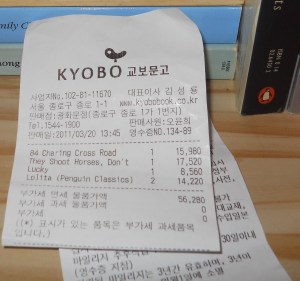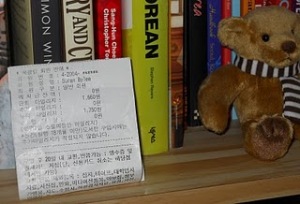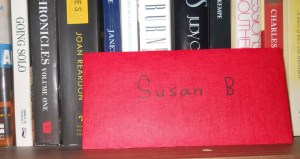It’s just what I expected, but I’m still annoyed that I only read six books this month. Work is quite demanding, so I’m starting to wonder about making it to 100 this year. Since it’s now National Poetry Month, I’ll go ahead and ask: What happens to a triple-digit dream deferred?
March: Page Plummet, Novel Nosedive
>Things You Shouldn’t Say In The Children’s Section Of The Bookstore
>What the hell. Even the very youngest readers know that sometimes, nothing but a curse word will do:

April 17 is my Bookleaves Book Club’s 100th book/meeting, so to celebrate, we decided to each read a Newbery winner and discuss our choices. I was determined to finally read the Newbery winner of 1961, Island of the Blue Dolphins, by Scott O’Dell. It’s also celebrating an anniversary: it’s been part of the select Newbery circle for 50 years now.
My forgetfulness two days ago seems to be part of a trend with this book. I looked for it at Gwanghwamun’s Kyobo bookstore in March, but I remembered the title as Julie of the Wolves. Kyobo didn’t have a copy. Veronica posted a Newbery Winners list on our Facebook page a few days after that. Ooops. Armed with the correct title, I made plans to pick it up when I went to Seoul again…and there you go. I don’t see how I could have forgotten. I’m practically living and breathing Children’s Literature this semester.
I could read a different Newbery winner, but now, nothing else will do. These glitches have made me wary. If I ask someone to send it to me, it’s bound to get lost. The only thing that will do is that I must go and fetch it myself. There’s a long subway ride in my very near future.
>I Had A Little Gift Card & I Stomped That Sucker Flat
>March 2011: Book Buying
>I hadn’t been to the Kyobo bookstore in Gwanghwamun since they remodeled, so when I was in Seoul for book group on March 20, I couldn’t resist a little look-see. I had been so good all month. 

>Late To The Table
> I don’t know how I let this challenge almost slip by me. I’m definitely in, tying on a napkin and going for the Bon Vivant level (4-6 books). This is the prompting that I need to finally read Becka’s copy of Chocolat, which I borrowed last fall. It’s also a great excuse to go shopping for some of those food memoirs I’ve been coveting. In addition, maybe this will compel me to stop circling copies of Good Morning, Kimchi! and take the plunge. The upcoming Readathon just got a little tastier. Is this ironic or just merely funny?… it’s the middle of the night, and I’m awake and wandering around in Blogland because of indigestion.
I don’t know how I let this challenge almost slip by me. I’m definitely in, tying on a napkin and going for the Bon Vivant level (4-6 books). This is the prompting that I need to finally read Becka’s copy of Chocolat, which I borrowed last fall. It’s also a great excuse to go shopping for some of those food memoirs I’ve been coveting. In addition, maybe this will compel me to stop circling copies of Good Morning, Kimchi! and take the plunge. The upcoming Readathon just got a little tastier. Is this ironic or just merely funny?… it’s the middle of the night, and I’m awake and wandering around in Blogland because of indigestion.
>The Custom of the Country -Edith Wharton
>Blogiversary!
>
Happy Birthday, Blob.
This is year #7 and it’s also my 600th post. Wow.
>Canadian Reading Challenge: Me Write Book: It Bigfoot Memoir
>.
This graphic novel? picture book? by Graham Roumieu is a delightfully and grubbily illustrated no-holds-barred memoir written in Biglish (Bigfoot English) is so much fun. Nasty, silly, profane, a gross-out fest, an encyclopedia of yuck — I can’t praise it highly enough.
.
Bigfoot tries hard to get by in the world and be a “forest gentleman” but the world often makes him “angry like Henry Rollins”. One of his few human friends, Chet, compares himself and Bigfoot to Han Solo and Chewbacca. Bad move, Chet:
.
I wake up next day with Chet scalp in mouth. Seriously, I not Chewbacca. Dude.
.
In Japan, he dons a mawashi and sumo wrestles wild animals:
.
Not want to toot own horn or anything, but I really good. I Harlem Globe Trotter of Sumo. Tear head off puma, throw head in garbage can 50 feet away and pretend play rest of body like guitar…walk down street everybody whisper: ‘Bigfroot! Bigfroot!’
He readily admits that his luck with women isn’t too great: Most of them run away, a few haul out the pepper spray, but Worst is when they do silent scream and vomit trickle down chin like hot fudge on sundae.
Even on the bad days, Bigfoot can always take comfort and pride in being one of a kind:
.
…me very proud of being on endangered species list because of all privalege of being in exclusive club. Some day, I just pick up phone, call Black Rhino and shoot the shit. I can even use the word rhino and shoot in same sentence and nobody think twice. Crazy! I get away with murder cause everyone think I fragile since I last of kind and so on.
Of course, the downside of being a rarity is that Bigfoot also attracts a lot of poachers. A safari hunter who had a yen for Bigfoot’s organs stalked him and studied his habits. Learning of Bigfoot’s love for Count Chocula cereal, he hid in the refrigerator, disguised as a carton of milk.
.
Unfortunately, for the hunter, Bigfoot had just decided to go on a low-carb diet:
.
…so no Chocula. Man freeze to death in fridge. Bigfoot also have cirrhosis at time so it convenient for me use him for liver transplant donor. Bigfoot enjoy irony.
Blame it on the compost smell or maybe that family of voles nesting in his armpit, but I find him pretty damn irresistable, and can’t wait to read his follow-up memoir, Bigfoot: I Not Dead.
>Canadian Reading Challenge: To Paris Never Again – Al Purdy
>I don’t know any good living poets. But there’s this tough son-of-a-bitch up in Canada that walks the line.
-Charles Bukowski-
Apparently, the hard-bitten admiration was mutual, because the first poem in Al Purdy’s last poetry collection published during his lifetime is “Lament for Bukowski” in which Purdy says, “You wrote like God with a toothache” and leaves even the most casual reader of Bukowski, or anyone who’s ever seen Barfly with this spot-on image:
Pop Bukowski in his coffin
dead as hell
but reaching hard for a last beer
and just about making it
The second poem in the collection, “On Mexican Highways” is a disturbing memory of being able to see the final expressions of a family in a car in the last seconds before they plunged from the trecherous road and down the mountainside. He compared it to a photo. Spooky stuff, the seeds of future nightmares.
To Paris Never Again consists largely of memories of the past that seem to have been covered in his earlier volumes, but this is no shambling about in old age — he’s revisiting these scenes expertly, eloquently. There are also meditations on approaching death and coming to grips with the passage of time:
The Clever Device
Time is a thing you invented
for a point of reference
for yourself
–after three score years
and ten of your clever device
you point to yourself
in the mirror
and say POUF
you no longer exist
and laugh
or not be able to laugh
I’m a little sorry (“soar-e”, as the Canadians would pronounce it) that Al Purdy wasn’t more of a fiction writer. (He wrote one novel rather late in his career, A Splinter in the Heart.) He had an endearing gift for detail and setting a scene. In “Case History”, he goes back to the 1950s and early 60s, hardscrabble years when he and his family were just barely getting by. They lived in an “A-frame house, half built” and he did a variety of odd jobs: “collecting scrap iron, picking tomatoes, selling apples door-to-door”. When even the odd jobs became scarce, they subsisted on “Kraft Dinner [macaroni and cheese] and cooked road-killed rabbits.”
.
One day, Purdy discovered the garbage dump near the Mountainview RCAF base and found discarded food rations. He brought his family back and they scavenged cans as well as “boxes of quarter-inch plywood and cans of red and black paint.” This “manna” meant that not only would they be able to eat better, he would be able to make progress on the A-frame:
With literary confidence
I didn’t really feel
Stashed the worksheets of a poem
inside the house overhang
along with a note
directing future discoverers
to take the sheets to the English Dept.
of any Canadian university
and receive as reward
for this unknown masterpiece
one small case of beer
or more likely
an embarassing question
“Purdy — who he?”
In another meditative poem, “Happiness”, Purdy has a lovely image about writing that echoed exactly how I feel about reading his work and just about reading and books in general:
Happiness
the writing itself
the words exploring
all my veins and arteries
Then, there’s that exquisite grappling again with life and time and what it all means:
–and by this time
it has become plain to me
that I’m not writing about happiness
at all but the puzzle of being alive
Purdy is also generous in making sure that people who helped him get credit. During the road-killed rabbit and Kraft Dinner days, there was an editor, Bob Weaver, who evidently saw promise in him and other struggling poets. “Do you need any money, Al?/Just send me some poems/I’ll make sure you get the cheque fast.” Purdy remarks, “Bob Weaver was Santa.”
I don’t know if he ever got any thanks
or for that matter wanted any
for making the connection
that these rather scruffy human beings
with all the faults of everyone else
were responsible (though very rarely)
for something that leaped up from the printed page
dazzled your brain
and fireflies whizzed in the cerebellum.
Another Carveresque short story masquerading as a poem, “Aphrodite At Her Bath” takes the reader back to Montreal, 1957 and relates an odd incident. Purdy’s wife’s cousin, a beautiful young woman is newly married and newly pregnant. She doesn’t want the baby and has heard that the combination of beer and a hot bath would induce a miscarriage. Purdy’s wife goes off to work and leaves the two there alone, the cousin sitting in the bath and Purdy fetching more and more of his home brew. They’re both getting sloshed, then abruptly, Purdy flashes-foward. Aphrodite is sixty now, he tells us, with two kids:
And now the venue changes
from Montreal to Sidney BC
Anno Domoni 1995
near forty years later
where I sit writing
these words on paper
trying to avoid the eyes
of quite a large crowd
of pro-life denonstrators
gathered threateningly
around this poem.
One of the last poems in To Paris Never Again is about Marius Barbeau (1885-1969), a Canadian ethnologist and folklorist. Barbeau spent years during his career living among the Native American tribes. One evening, when Barbeau was older and largely retired from field work, Purdy asked him about Tsimsyan drumming dances. Instead of telling, Barbeau said he’d show him. Purdy writes that Barbeau really got into it and forgot everything, “focused on only the mountain at the end of the sky.” Purdy admits that at the time “I was embarrassed for him/but now I’m embarrassed/that I was embarrassed/Barbeau was one of the ancient rememberers.”
I first became acquainted with Al Purdy’s work in his 1984 collection Piling Blood. I’m now reading 1965’s The Cariboo Horses and meeting the younger Al(fred) Purdy, with smiles and shocks of recognition, a growing affection and that deepening sense of sadness readers get when they freshly discover someone who is long gone. I want to know all the incarnations of Purdy, all the way back to 1944 and his debut collection, The Enchanted Echo.
Purdy died in 2000, three years after To Paris Never Again was published. His stuff (I don’t mean “stuff” trivially or dismissively. I mean it in the baseball sense, in which a pitcher is lauded for his “stuff” — his talent and skills) makes me wish I could have met him and shared a glass of his home brew.
I’m really grateful to my Canadian friend, Jim Cooper, who is sharing his Al Purdy collection with me. I’m also glad that John Mutford continues to host the Canadian Book Challenge. Wish I could give my thanks in the shape of a poem, guys.


